In the prime of life, let’s say when I was in my twenties and thirties, I had little interest in the health issues of peers and seemingly healthy friends. Our kids’ medical problems, especially son Dan’s asthma and chronic pneumonia, used up most of the small amount of empathy I didn’t keep bottled up.
By the time I reached the age of majority, three of my four grandparents were dead, struck down by diseases that proved incurable but would today be quite manageable. My mother, who was the most involved relative with their end-of-life care, became, if she wasn’t always, an undiagnosed hypochondriac.
Now that I’m on the bottom right side of the longevity bell curve, I can open up my whole inventory of empathy for dear old Mom. It was trying sometimes to be around her and listen to the endless symptoms she was having. In her mind, she always assumed the most dire diagnosis to explain what she was dealing with. I empathize with her doctors, who treated her with patience, if not understanding.
Hypochondria is a mental health condition characterized by excessive and undue worry about having or developing a serious illness, even when there’s little or no medical evidence to support such concerns. It now has a 21st-century name, Illness Anxiety Disorder (IAD),
The core feature of IAD is a persistent preoccupation with the idea that one is seriously ill or will become seriously ill. Mom would often misinterpret normal body sensations and minor physical signs as evidence of a severe, life-threatening disease. Especially for herself, but the rest of us weren’t immune to her anxiety.
Mom was a Depression-era child raised in the bucolic countryside of north central Minnesota. After the big war, she married and moved to “the cities,” had two kids, and found a doctor who made house calls. She always was an anxious person, a worrywart, we called her.
My mother’s hypochondria was exacerbated by the Dr. Kildare and Dr. Ben Casey television shows in the early sixties. These shows captivated her with their handsome doctors and uncanny success in diagnosing and treating rare medical conditions. Marcus Welby, M.D., became her spiritual guide, ranking above even Lutheran Ministers and God in her eyes. She worshiped all three, and the influence of these shows on her perception of health was profound.
Readers Digest, a monthly magazine delivered by mail, always featured a story about the survivor of a terrible disease or devastating accident. She consumed each issue and, in her semi-regular doctor visits, would discuss symptoms she was having, asking if they might indicate she was stricken with the medical issue featured in the latest edition. The good news, she never was. She almost managed to make it to her tenth decade, and for many years, she actually was stricken with real maladies. I’m so damned glad she never was interested in googling her symptoms.
On a positive note, some of the Digest’s articles were enticing plagiarism targets for my speech class assignments. So yes, I pulled the wool over my teacher’s eyes and fell deeper into cynicism and skepticism about authority figures.
In the early days of business ownership, I was in partnership with two other guys. We worked hard, generally. Sometimes, we had a good time fishing and consuming adult beverages.
One of the guys, let’s call him Nathan, was about my age, and he had undiagnosed hypochondria, we decided. His syndrome of choice was orthopedic issues: knees, elbows, and shoulders. He’d managed to arrange and suffer through several minor surgeries.
Cynical as we were, we started sharing a little slander like this: Picture two orthopedic surgeons enjoying morning coffee together in the hospital cafeteria. The first surgeon looks across the table and announces, “I operated on Nathan yesterday for $4,000.”
The second doc asks, “What did he have?”
The first doc replies, “$4,000.”
We overused a stereotype about surgeons’ financial integrity. That wasn’t intended and certainly isn’t true. It’s like the stereotype of cops and donut shops—fun, but not intended to offend. Please don’t send me nasty emails.




